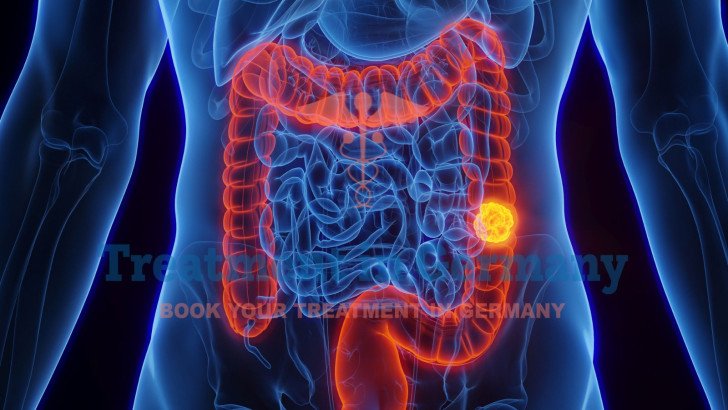
Colorectal cancer, encompassing malignancies of the colon and rectum, stands as the third most prevalent cancer globally and ranks second in cancer-related mortality.
Colorectal cancer, encompassing cancers of the colon and rectum, is a major global health concern requiring comprehensive treatment strategies to optimize outcomes. In Germany, cancer treatment integrates advanced therapies such as surgery, targeted therapy, immunotherapy, and dendritic cell therapy, delivered by expert doctors, including German oncologists and colorectal specialists, in state-of-the-art hospitals.
Colorectal cancer is the third most common cancer in Germany, with approximately 60,000 new cases annually. Risk factors include obesity, diabetes, high cholesterol (hyperlipidemia), autoimmune diseases, and lifestyle factors like smoking or a high-fat diet. Early-stage (I-II) colorectal cancer has a 90% 5-year survival rate, while stage IV, with distant metastases, drops to 15%. Germany’s multidisciplinary approach combines precise diagnostics with innovative treatments to control disease, reduce recurrence, and improve quality of life. Hospitals leverage latest research to deliver personalized cancer therapy.
Accurate diagnosis is critical for effective colorectal cancer management. Doctors use advanced tools to confirm the diagnosis, stage the cancer, and guide treatment.
German oncologists in DKG-certified hospitals provide rapid diagnoses, often within days, enabling prompt innovative cancer treatments.
Colorectal Cancer Treatment Options in Germany
Germany offers a comprehensive range of treatments for colorectal cancer, tailored to cancer stage, molecular profile, and patient health. Hospitals integrate cancer treatment options to optimize outcomes.
Surgery
Surgery is the primary treatment for localized colorectal cancer, aiming to remove tumors and affected tissues.
Chemotherapy
Chemotherapy targets residual or metastatic cancer cells, often using regimens like FOLFOX or FOLFIRI. Adjuvant chemotherapy reduces recurrence by 30-40% in stage III, while palliative chemotherapy extends survival by 6-12 months in stage IV.
Targeted Therapy
Targeted therapy addresses specific molecular pathways. Key options include:
Genetic testing ensures precision, supporting innovative cancer treatments.
Immunotherapy
Immunotherapy is effective for microsatellite instability-high (MSI-H) colorectal cancers (10-15% of cases). Checkpoint inhibitors like pembrolizumab or nivolumab achieve 30-50% response rates in metastatic MSI-H tumors, extending survival by 12-24 months (KEYNOTE-177 trial, 2020). Dendritic cell therapy, an innovative cancer treatment, trains dendritic cells with tumor antigens (e.g., CEA, MUC1), boosting T-cell responses. This outpatient therapy, with mild side effects like fever, enhances cancer therapy for advanced cases.
Radiotherapy
Radiotherapy, often combined with chemotherapy, is used for rectal cancer to shrink tumors before surgery or palliate metastatic disease. Stereotactic body radiotherapy (SBRT) targets liver metastases with 80-90% local control, per latest research.
Ablative Therapies
For patients with limited metastases, radiofrequency ablation (RFA) or microwave ablation destroys tumors, extending survival by 6-12 months in 50% of cases, offered in specialized hospitals.
Clinical Trials and Emerging Therapies
Germany leads in innovative cancer treatments, offering trials for CAR T-cell therapy, bispecific antibodies, and neoantigen vaccines. Trials show 20-40% response rates in resistant cases, advancing cancer treatment options.
Why These Treatments Are Effective for Colorectal Cancer
Colorectal cancer treatments succeed because:
Hospitals achieve 80-90% 5-year survival in early stages and extend survival in stage IV by 12-24 months.
Benefits of Colorectal Cancer Treatment in Germany
Germany’s cancer treatment options offer significant advantages:
Side effects, like chemotherapy-related fatigue or mild immunotherapy reactions, are managed by doctors, ensuring patient comfort.
Complementary Therapies Supporting Colorectal Cancer Treatment
Complementary therapies enhance recovery:
These are standard in hospitals, ensuring holistic cancer therapy.
Why Germany Excels in Colorectal Cancer Treatment
Germany leads in cancer treatment due to:
Advanced Facilities: DKG-certified hospitals use PET-CT, robotic surgery, and molecular diagnostics.
Germany’s colorectal cancer survival rates exceed EU averages by 5-8%, reflecting its expertise.
Conclusion
Colorectal cancer integrates surgery, targeted therapy, immunotherapy, dendritic cell therapy, radiotherapy, and ablation, tailored to patient needs. Delivered by expert German oncologists in DKG-certified hospitals, these cancer treatment options control disease and enhance quality of life. With complementary therapies and trial access, Germany is a premier destination for colorectal cancer care.
FAQS
How is colorectal cancer diagnosed in Germany?
Colonoscopy, PET-CT, biopsy, and genetic testing confirm colorectal cancer and its stage.
What treatments are available for colorectal cancer in Germany?
Options include surgery, targeted therapy, immunotherapy, dendritic cell therapy, and radiotherapy.
How much does colorectal cancer treatment cost in Germany?
Costs vary based on treatment plan; estimates can be requested from medical facilities.
Can colorectal cancer be cured in Germany?
Early-stage colorectal cancer is often curable; advanced cases are managed with cancer therapy.
How effective are colorectal cancer treatments in Germany?
Treatments like immunotherapy and targeted therapy achieve high success in innovative cancer treatments.
How experienced are clinicians with colorectal cancer in Germany?
German oncologists are global experts in cancer treatment options for colorectal cancer.
How long is the wait for colorectal cancer treatment in Germany?
Treatment starts within 1-2 weeks, ensuring prompt cancer therapy in Germany.
Are clinical trials available for colorectal cancer in Germany?
Yes, trials for innovative cancer treatments like CAR T-cell therapy are available
How does Germany’s colorectal cancer treatment compare to other countries?
Germany leads with advanced cancer treatment options and superior outcomes.
Can I get a treatment plan before traveling to Germany?
Yes, facilities provide personalized colorectal cancer treatment plans based on medical records.
For more information or a free consultation, visit our contact us page.
Kindly complete the form below, and our dedicated team will reach out to you promptly. We look forward to connecting with you soon!
Trierer Straße, 56072 Koblenz, Germany

.webp)
 (1).webp)

.webp)
 (1).webp)


.webp)
 (1).webp)

.webp)
 (1).webp)
